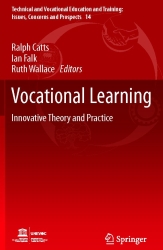
The UNESCO-UNEVOC International Centre: Who We Are | What We Do | Working With Us | Get in Touch
The UNEVOC Network: Learn About the Network | UNEVOC Network Directory
For Members: UNEVOC Centre Dashboard
Thematic Areas: Inclusion and Youth | Digital Transformation | Private Sector Engagement | SDGs and Greening TVET
Our Key Programmes & Projects: BILT: Bridging Innovation and Learning in TVET | Building TVET resilience | TVET Leadership Programme | WYSD: World Youth Skills Day
Past Activities: COVID-19 response | i-hubs project | TVET Global Forums | Virtual Conferences | YEM Knowledge Portal
Our Services & Resources: Publications | TVET Forum | TVET Country Profiles | TVETipedia Glossary | Innovative and Promising Practices | Toolkits for TVET Providers | Entrepreneurial Learning Guide
Events: Major TVET Events | UNEVOC Network News
 Ralph Catts, Ian Falk and Ruth Wallace (Eds.)
Ralph Catts, Ian Falk and Ruth Wallace (Eds.)
Vol. 14, Technical and Vocational Education and Training: Issues, Concerns and Prospects
2011, 279 p
ISBN (print): 978-94-007-1538-7
Effective knowing and learning for vocational purposes must take account of the wide range of variables that impact on knowledge formation and that promote learning. In light of those many variables, the formal sector of technical and vocational education and training (TVET) must constantly ask itself what it could and should do to better provide vocational learning for those people likely to pursue learning via the informal sector. This book addresses that question.
This latest volume in the UNESCO-UNEVOC TVET book series discusses four theoretical aspects of vocational learning that support understanding of vocational learning processes and practices: the situations of vocational learning; the power and roles of social networks and identity in vocational learning; knowing and knowledge management processes; and the implications for pedagogic practices in both informal and formal TVET systems. The book provides an overview of a series of international examples of innovative approaches to vocational educational theory and practice, and it draws on empirical research to analyze the effects of those approaches. It includes unique insights into aspects of TVET for Indigenous peoples. With a discussion of policy implications for Europe, North America and Australia, this book is an instrumental tool to understand the underlying factors that generate effective educational and workforce outcomes through effective formal and informal learning.
Table of contents, introduction and extracts![]()
Order
Buy this book from Springer Science and Business Media![]()